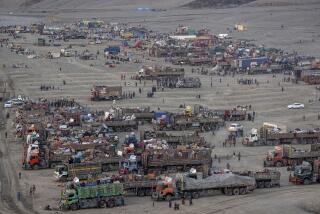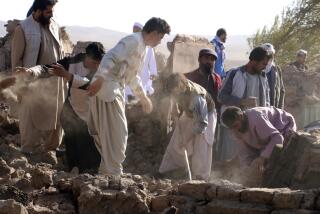Vast Influx of Returning Refugees Worsens Afghanistan’s Health Crisis
KABUL, Afghanistan — Health officials here warned Thursday that the rising tide of returning refugees poses significant health risks for a country already suffering one of the highest rates of infant and maternal mortality in the world.
The influx of Afghans returning from Pakistan, Iran and other countries has severely burdened a health system taxed by war, drought and food shortages, said Dr. Abdullah Fahim, spokesman for the Health Ministry.
Since March, an estimated 1.5 million Afghans have returned in what refugee officials have characterized as one of the fastest repatriations on record--and at three times the rate initially expected. About one-third, or 500,000, have come to Kabul, swelling the capital’s population by about 25%.
Cholera is of special concern in urban areas, where there are shortages of safe drinking water and proper sanitation systems. Although isolated cases of the disease have been reported in recent weeks, Fahim said there has been “no massive outbreak.” Nevertheless, some hospitals have taken to isolating patients with severe diarrhea in order to prevent an epidemic, he said.
Particularly vulnerable to health problems are newborns and their mothers, who already suffer mortality rates second only to those in the war-torn African nation of Sierra Leone. One in four Afghan children dies before reaching age 5, while one in 57 women who give birth dies during labor, according to a 1997 survey, the most recent.
The United Nations, in cooperation with the Centers for Disease Control and Prevention in Atlanta and the Afghan Health Ministry, is updating the infant and maternal mortality survey. Fahim expects it will show that rates have risen since 1997 because restrictions imposed by the strict Islamic Taliban regime put women at greater risk.
Dr. Fahima Sekandari, director of Malalai Hospital in Kabul, noted that the Taliban government restricted the movement of women and prohibited them from seeing male doctors for their obstetric and gynecological needs. As a consequence, more women and infants died from lack of adequate care. The Taliban was overthrown by U.S.-led forces last fall.
“Every half-hour an Afghan woman dies giving birth,” said Sekandari, who said her facility is the nation’s only maternity clinic. “For the last five years, the world progressed and we were left behind.”
Dr. Gulestani Parvin, anesthesiologist at the hospital, said, “The conditions resulting from the Taliban sabotaged women’s health.”
Afghanistan’s health problems are worsened by shortages of food. In Washington, U.S. aid officials warned Thursday that the country will face a hungry winter unless international food deliveries are stepped up.
A State Department official also chastised the European Union for failing to deliver money fast enough after promising to help Afghanistan. An EU spokesman in Washington said the criticism was unwarranted.
Already, the slow arrival of food aid has forced the United Nations to reduce by a third the amount of wheat given in “welcome home” packages it has been handing out to returning refugees, said Arthur E. “Gene” Dewey, assistant secretary of State for the Bureau of Population, Refugees and Migration.”That’s cutting into the bone,” he said. “That’s not cutting any fat.”
An EU spokesman in Washington, Wilfried Schneider, said the EU has pledged $200 million to the aid effort and has delivered $115 million. It is also funding nongovernmental organizations, he said.
The strain from the flood of refugees is evident in Afghanistan’s cities, as garbage accumulates on streets. Open sewers flow past the doors of dwellings, even at the entrance of one hospital.
Only 20% of Kabul’s residents have piped-in water; the rest get their supply at public pumps or wells, many of which are contaminated.
Fahim, the Health Ministry spokesman, said the deterioration of Afghanistan’s roads, the destruction of clinics and hospitals and the flight of doctors and nurses escaping war and repression all contributed to the degradation of the health system.
As a result, children in a major Kabul pediatric hospital are crowded three to a bed, he said.
There are about 7,000 doctors to treat a population of 28 million, but they are concentrated in a few urban areas. Vast rural stretches are without any effective medical care.
In addition, the nation suffers a serious shortage of nurses and midwives. In most countries, an adequate ratio of nurses and midwives to doctors is considered four to one, Fahim said, while in Afghanistan there is barely one nurse or midwife to each doctor.
The bottom line: While 99% of North American women receive professional assistance during childbirth, only 10% of Afghan women do, said Shairose Mawji, a U.N. project officer here who is helping direct the new survey.
Afghanistan’s electrical shortages and four-year drought are contributing to sanitation problems. Mountain reservoirs that power Kabul’s three hydroelectric plants are at dangerously low levels, forcing the Power and Water Ministry to cut off electricity for 12 hours a day to all but a few vital installations.
The lack of electricity causes water service to stop because there is no energy for the pumping stations. The lack of pressure allows seepage into the war-damaged pipes, letting in contaminants.
*
Times staff writer Sonni Efron in Washington contributed to this report.
More to Read
Sign up for Essential California
The most important California stories and recommendations in your inbox every morning.
You may occasionally receive promotional content from the Los Angeles Times.









